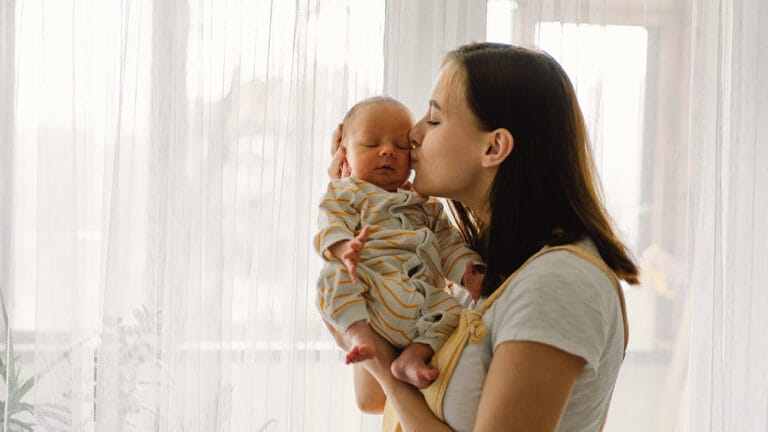As a parent, sleep loss is part of your life.
But for your kids, losing sleep can seriously damage their development and growth. Since their brains are still pliable and growing, they are susceptible to small stresses we don’t even notice as adults.
Good baby sleep habits will help your child succeed throughout his or her life. Understanding sleep hygiene for kids is crucial, and starting young in helping them get the amount of rest they need each night.
You might be worried about your child’s sleep. If they’re acting moody throughout the day, you might suspect they aren’t getting enough rest. This underscores the importance of sleep in child development, as insufficient sleep can impact mood and behavior. Is it hard to get them out of bed in the morning? Are they clingy when you try to put them down and leave the room? These are signs your child isn’t getting good quality sleep.
This article will cover how to create good sleep habits for kids, what is considered healthy sleep, how to tell what kind of sleep your child is getting, and how to change bad habits.
What Are Good Sleep Habits?
Sleep habits are the things you and your children do to create a nightly routine. These can include:
- Reading a story
- Taking a bath
- Drinking a warm glass of milk
- Praying
- Getting tucked in
It’s much easier to create a routine when your child is young, rather than correcting a bad one when they’re older. Leaning how to help your child sleep better involves creating and maintaining a bedtime routine, which most research on the subject stresses.
The best routine is one you can do at the same time every night. Creating a regular nightly routine helps your child get tired on their own. When you do the same things before bed each night, it tells their brain it’s time to sleep.
Sleep Habits Start at an Infant Age
Infant sleep habits will go on to influence how your child sleeps for the rest of his or her life. If they don’t learn how to fall asleep when they are younger, it’ll be difficult for them to sleep as the years go on.
Every child is a little different. While there is a general guideline of how long your child should be sleeping, if they haven’t moved on to the next stage yet, don’t fret. This variability also highlights why sleep is important for children, as everyone develops at a different pace, and it’s okay if your child isn’t at the same place as his or her peers.
Good sleep habits for babies change depending on their age. Each month that goes by will mark a change in the length and quality of their rest.
This is the most crucial time for you to enforce good sleeping practices. Your infant will take sleeping cues from you, so it’s important to stay strong in creating a good sleeping routine for your child.
Why Do Babies Sleep Habits Change?
Your child’s brain changes as he or she ages. As their brain matures, his or her sleeping habits will change to support each process. This is perfectly natural and nothing to worry about. The easier it is for you to adapt to these changes, the more likely your child is to sleep soundly.
How to tell what kind of sleep your child is getting
A common symptom of your child not getting enough sleep may be behavior. Does your child tend to throw tantrums at the drop of a hat? Is he sleepy during the day? Does she exhibit hyperactive or aggressive behavior? Is it difficult for them to focus on schoolwork or other activities?
One of the best pieces of literature on children’s sleeping patterns is Healthy Sleep Habits Happy Child by Doctor Marc Weissbluth. His book is a great overview of sleep for your children, as well as tips for breaking bad sleeping habits and how to help your children have better sleep.
Weissbluth says healthy sleep has five components. The following list is taken from his book:
- Sleep duration: does your child get enough sleep?
- Naps: does your child need several naps to get through the day?
- Sleep consolidation: does your child sleep in bursts or all at once?
- Timing of sleep: does your child sleep at night or during the day?
- Sleep regularity: does your child stick to a sleep schedule each night?
Newborns have poor sleep according to this schedule because they’re still learning how to function. Healthy baby sleep habits won’t be firmly established until 10-12 months and will continue to change as they take on more responsibilities.
Good baby sleep habits vs bad babies sleep habits
When your child is first born, they’re still learning how to exist in the world. The first few weeks or months will be hard because they won’t understand how to sleep through the night yet. You’ll need to help them develop good baby sleep habits. Learn to recognize signs of sleepiness and put your baby to bed when he or she starts to doze off will help them learn to develop good sleeping skills as they age.
Signs of sleepiness include:
- Eye rubbing
- Fussiness
- Lots of yawning
- Reluctance to look at you
You may be tempted to let your child fall asleep during feeding or while rocking them. However, this sets a bad precedence, as they will expect you to hold them before falling asleep and may not be able to sleep without it.
Why Has My Child’s Sleep Habits Changed?
There are many reasons why your babies sleep habits might have changed.
Your child’s age has a major influence on what healthy sleep looks like. As a newborn, your baby needs to eat every couple hours. They’ll wake up frequently and sleep for short bursts at first. Their schedule should become more normal as they get older.
Illness can also impact baby sleep habits. If your child was once sleeping through the night, but suddenly starts to wake up more often, this could be a sign of a cold or ear infection.
There are several life events that can impact sleep habits for babies. Stressful changes like a move or a new school year can make your child anxious, which makes it difficult for them to sleep. But these things tend to go away with time. If it’s been a few weeks and they’re still struggling, you might want to take them to see a doctor.
How to Improve Sleep Habits
If your child is exhibiting irritable behavior, you’ll want to take some efforts to change his or her sleeping habits. Your baby will take a lot of cues from you and will follow the example you set.
Help them learn self-soothing skills instead of rushing to comfort them when they cry during the night and they’ll have an easier time falling asleep when you can’t be there.
Make sure you work to teach them the difference between night and day. When they’re alert in the daytime, give them plenty of stimulation. During the night, stay quiet and keep the lights and noise low. Put your child down when they’re sleepy, but not yet asleep to help him or her learn to fall asleep on their own.
When to See a Doctor
If you try the above fixes and find they still aren’t able to sleep, it’s time to see a pediatrician. If environmental changes aren’t enough, then it’s possible there’s something wrong with your child.
If you’re worried about your child’s sleep habits, you can bring them in to our office for a pediatric checkup. We have two offices in the valley, conveniently located in Riverton and South Jordan.
Most of the time, simple lifestyle changes can help you and your child get better rest. Try not to lose hope as you make an effort to improve your child’s sleep. They’ll thank you as they get older, and their health will thank you, too.
Struggling with breastfeeding?
Overcome common nursing challenges and make feeding time rewarding for you and your baby by meeting with one of our friendly, experienced, IBCLC-certified lactation consultants.
Reminder: Most health insurance companies require adding your new child within 30 days of birth. Make a note to add your baby to your policy within this window to ensure all their visits are covered.







